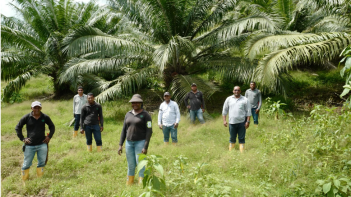Singapore – WWF is urging investors to do more to promote sustainable palm oil, backed by findings from a new survey released during a high-level meeting of investors and producers in Singapore.
WWF’s first-of-its-kind Palm Oil Investor Review 2012 surveyed 35 key palm oil sector investors to assess how they are managing the challenges associated with sustainable palm oil and outlines the role they can play in moving the industry toward greater sustainability.
“Investors are uniquely placed to influence investee companies to adopt sustainable practices through active engagement and exercise of proxy voting rights, and through directing their investment capital towards sustainable palm oil producers, ” said WWF’s
Jeanne Stampe, co-author of the report.
Key recommendations
The review recommends that investors incorporate environment, social and governance (ESG) issues into ownership polices and engage more actively with investee companies across the supply chain to get them to make commitments to certified sustainable palm oil (CSPO). Investors and the Roundtable on Sustainable Palm Oil (RSPO) should also develop much deeper engagement to realize mutual benefits. In addition, investors should pressure stock exchanges to mandate minimum reporting requirements for high impact sectors like palm oil.
“Understanding the dynamics at play is key to harnessing the power of investors to shape the palm oil industry. Given the strong link between sustainability and investment success, investors need to highlight to investee companies that integrating sustainability into the core strategy and operations allows them to derive business benefits, access a broader pool of capital and deliver better investment performance,” said Stampe.
The review also calls for the RSPO to support investors by educating its financial members about the palm oil sector and the costs and benefits of RSPO certification. This includes helping them develop and share best practice tools as well as publishing uniform data on how palm oil supply chain companies are performing against ESG issues.
The sustainable palm oil challenge
More than 50 million tonnes of palm oil are used worldwide each year in everyday products including food and cosmetics. From 2010 to 2020, this volume is projected to increase by over 65%. The growing demand for palm oil has resulted in rapid and poorly managed expansion of production, causing deforestation, species loss, greenhouse gas emissions and social conflicts with local communities.
Breaking down the barriers
Investors can help mitigate these problems. However, the survey shows there are hurdles to overcome as investors face internal organizational and capacity constaints in addressing ESG risks. Investors also need more disclosure, transparency and access to ESG research in order to have productive engagement with their investee companies on sustainability issues. The review recommends potential solutions to these hurdles.
WWF support
WWF has been active in the palm oil financing arena for the past five years, and will continue to support the financial sector to drive sustainability in palm oil production by providing information and guidance through tools, research updates, and workshops with finance sector partners.
“The palm oil sector presents an attractive growth proposition for investors, but ESG issues and the lack of company disclosure still cloud the ability of many to invest,” said Jeanne Stampe. “”If we all – investors, the RSPO and stakeholders such as WWF – work together, we can ensure that the palm oil industry expands in a sustainable way, so that long-term investment returns are enhanced and emerging economies benefit from sustainable development.”
For further information:
Chris Chaplin – Media Officer Asia Pacific, WWF International,
+86 10 6511 6272, Mobile: +86 13911747472, [email protected]
Notes to editors
The full verion of Palm Oil Investor Review 2012 is available for download at http://awsassets.panda.org/downloads/wwf_palmoil_investorreview.pdf.
About WWF
WWF is one of the world’s largest and most respected independent conservation organizations, with over 5 million supporters and a global network active in over 100 countries. WWF’s mission is to stop the degradation of the earth’s natural environment and to build a future in which humans live in harmony with nature, by conserving the world’s biological diversity, ensuring that the use of renewable natural resources is sustainable, and promoting the reduction of pollution and wasteful consumption. www.panda.org/news for latest news and media resources
Keep reading

Access into prisma

10 Years of RSPO in China: Driving Palm Oil Transformation Towards Sustainability

Updated Trace Function in prisma

Call for Expression of Interest: Independent Investigation of a Complaint

Latin American Smallholders, Key Global Brands Gather in Peruvian Amazon to Advance Sustainable Palm Oil

RSPO Forum for Members and Certification Bodies 2025: Strengthening Capacities and Building Bridges with RSPO Members

From Violence to Prosperity: Cultivating Sustainable Palm Oil in San Pablo, Colombia




